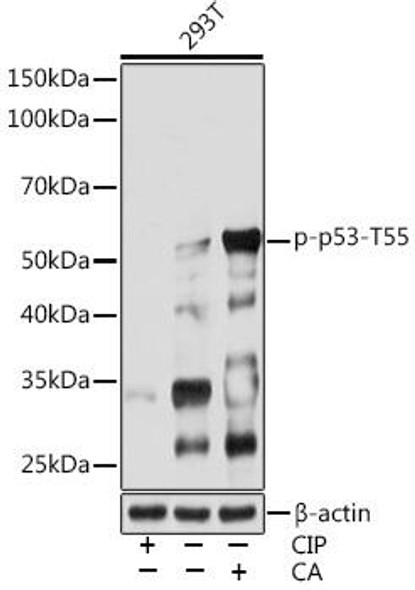Anti-p53 DINP1 Antibody (CAB5952)
- SKU:
- CAB5952
- Product Type:
- Antibody
- Antibody Type:
- Monoclonal Antibody
- Reactivity:
- Human
- Reactivity:
- Mouse
- Reactivity:
- Rat
- Host Species:
- Rabbit
- Isotype:
- IgG
- Synonyms:
- SIP
- Synonyms:
- TP53DINP1
- Synonyms:
- TP53INP1A
- Synonyms:
- TP53INP1B
- Synonyms:
- Teap
- Synonyms:
- p53DINP1
- Research Area:
- Cell Death
Description
| Product Name: | p53 DINP1 Rabbit mAb |
| Product Code: | CAB5952 |
| Size: | 20uL, 50uL, 100uL |
| Synonyms: | SIP, TP53DINP1, TP53INP1A, TP53INP1B, Teap, p53DINP1 |
| Applications: | WB, IHC, IF |
| Reactivity: | Human, Mouse, Rat |
| Host Species: | Rabbit |
| Immunogen: | A synthesized peptide derived from human p53 DINP1 |
| Applications: | WB, IHC, IF |
| Recommended Dilutions: | WB 1:500 - 1:2000 IHC 1:50 - 1:200 IF 1:50 - 1:200 |
| Reactivity: | Human, Mouse, Rat |
| Positive Samples: | HepG2, A-549, BxPC-3, RAW264.7, C6, Mouse lung, Mouse liver, Rat lung |
| Immunogen: | A synthesized peptide derived from human p53 DINP1 |
| Purification Method: | Affinity purification |
| Storage: | Store at -20°C. Avoid freeze / thaw cycles. Buffer: PBS with 0.02% sodium azide, 0.05% BSA, 50% glycerol, pH7.3. |
| Isotype: | IgG |
| Sequence: | Email for sequence |
| Gene ID: | 94241 |
| Uniprot: | Q96A56 |
| Calculated MW: | 32kDa |
| Observed MW: | 27KDa |
| UniProt Protein Function: | TP53INP1: Antiproliferative and proapoptotic protein involved in cell stress response which acts as a dual regulator of transcription and autophagy. Acts as a positive regulator of autophagy. In response to cellular stress or activation of autophagy, relocates to autophagosomes where it interacts with autophagosome-associated proteins GABARAP, GABARAPL1/L2, MAP1LC3A/B/C and regulates autophagy. Acts as an antioxidant and plays a major role in p53/TP53-driven oxidative stress response. Possesses both a p53/TP53-independent intracellular reactive oxygen species (ROS) regulatory function and a p53/TP53-dependent transcription regulatory function. Positively regulates p53/TP53 and p73/TP73 and stimulates their capacity to induce apoptosis and regulate cell cycle. In response to double-strand DNA breaks, promotes p53/TP53 phosphorylation on 'Ser-46' and subsequent apoptosis. Acts as a tumor suppressor by inducing cell death by an autophagy and caspase-dependent mechanism. Can reduce cell migration by regulating the expression of SPARC. 2 isoforms of the human protein are produced by alternative splicing. |
| UniProt Protein Details: | Protein type:Apoptosis; Tumor suppressor; Cell cycle regulation Chromosomal Location of Human Ortholog: 8q22 Cellular Component: PML body; autophagic vacuole; cytoplasmic vesicle; nucleus; cytosol Molecular Function:antioxidant activity; protein binding Biological Process: negative regulation of cell proliferation; transcription, DNA-dependent; response to heat; apoptosis; positive regulation of transcription, DNA-dependent; autophagic cell death; response to stress; cell cycle arrest; negative regulation of cell migration; positive regulation of autophagy; autophagic vacuole formation |
| UniProt Code: | Q96A56 |
| NCBI GenInfo Identifier: | 209180469 |
| NCBI Gene ID: | 94241 |
| NCBI Accession: | NP_001129205.1 |
| UniProt Secondary Accession: | Q96A56,Q969R9, B2RCE5, |
| UniProt Related Accession: | Q96A56 |
| Molecular Weight: | 27,366 Da |
| NCBI Full Name: | tumor protein p53-inducible nuclear protein 1 isoform b |
| NCBI Synonym Full Names: | tumor protein p53 inducible nuclear protein 1 |
| NCBI Official Symbol: | TP53INP1 |
| NCBI Official Synonym Symbols: | SIP; Teap; p53DINP1; TP53DINP1; TP53INP1A; TP53INP1B |
| NCBI Protein Information: | tumor protein p53-inducible nuclear protein 1; p53-inducible p53DINP1; stress-induced protein; p53-dependent damage-inducible nuclear protein 1 |
| UniProt Protein Name: | Tumor protein p53-inducible nuclear protein 1 |
| UniProt Synonym Protein Names: | Stress-induced protein; p53-dependent damage-inducible nuclear protein 1 |
| Protein Family: | Tumor protein p53-inducible nuclear protein |
| UniProt Gene Name: | TP53INP1 |
| UniProt Entry Name: | T53I1_HUMAN |






